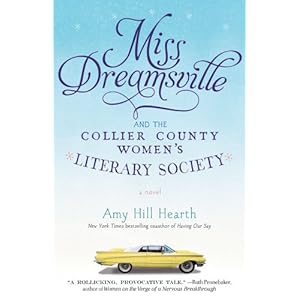 In the early 1960s, social changes were on the rise in our nation, but not all areas of the country were on board with, or possibly even aware of what was to come. In the debut novel Miss Dreamsville and the Collier Count Women’s Society, from journalist and nonfiction author Amy Hill Hearth, the arrival of one “Yankee” woman in Naples, Florida, brings many of these changes directly to the quiet southern town.
In the early 1960s, social changes were on the rise in our nation, but not all areas of the country were on board with, or possibly even aware of what was to come. In the debut novel Miss Dreamsville and the Collier Count Women’s Society, from journalist and nonfiction author Amy Hill Hearth, the arrival of one “Yankee” woman in Naples, Florida, brings many of these changes directly to the quiet southern town.
The book opens with the narrator identifying herself as 80-year-old Dora Witherspoon, better known in her town as the Turtle Lady due to her occasional habit of rescuing wild turtles in bad situations. Though she’s not a fan of the nickname, as she describes it, “here in the South, nicknames stick like bottomland mud.” Dora begins to tell the story of 1962, a tale that she admits is not easy to tell, but one that she feels needs to be shared. Her story centers around the arrival of Jackie Hart, a Boston transplant who moved to Collier County with her husband and children as a result of her husband’s job. Jackie was like no one the town had ever seen before, and over the course of a year, her actions had an effect on its citizens, especially the group of residents who joined her to form the title’s group– the Collier County Women’s Literary Society.
The individuals who formed this “society,” would never before have come together in any other situation. In addition to Jackie and Dora (a divorced woman working at the post office and living alone), there were Miss Lansbury (the unmarried librarian ), Mrs. Bailey White (an elderly woman who happened to be an ex-con, having served prison time for the supposed murder of her husband), “Plain Jane” (a fifty-something year old woman who only vaguely described her work as a freelance writer), Priscilla Harmon (a young, black woman who worked as a maid to a wealthy woman in town), and Robbie-Lee Simpson (a man who identified with the group’s desire for cultural and literary experiences, and the town’s only obviously homosexual man).
The group’s eyes are opened collectively, and in individual ways through their choices of reading and shared experiences. They begin to understand each other, as well, and their traditional ways of thinking about life in their town are challenged, especially as a result of Jackie’s way of openly speaking her mind, something with which Southern women were completely unaccustomed. With the introduction of “Miss Dreamsville,” a female late-night radio host whose identity is a big mystery, the entire town becomes swept up in a wave of change without even realizing it.
At one point in the story, Jackie was lamenting her family’s relocation from Boston to Naples, and she’s asked what she had expected moving to the South. Her response was one that I could relate to, stating that she didn’t think of Florida as part of “The South.” She’s quickly reminded of Florida’s history with slavery and secession by the other members of her group, and as time goes on, she has enough first-hand experiences to solidify her understanding of the nature of south Florida at the time.
I loved the storytelling vibe of this book, and Dora’s voice as narrator is engaging and spiked with humor (seemingly unintended at times) even in dark moments. Though I’m not one to routinely seek out stories from this time period in the South, I was quickly drawn in by the congenial tone of the story, and the series of events in the book were compelling and entertaining, even when uncomfortable and difficult to imagine. I believe Miss Dreamsville and the Collier Count Women’s Society will be a novel much discussed by readers and book clubs in coming months.
Dawn fits in her reading on public transportation, during breaks at work, and in sneak-away-trips to the bathroom when her children aren’t looking. Every once in a while, she gets a chance to share her own thoughts via her blog, my thoughts exactly.